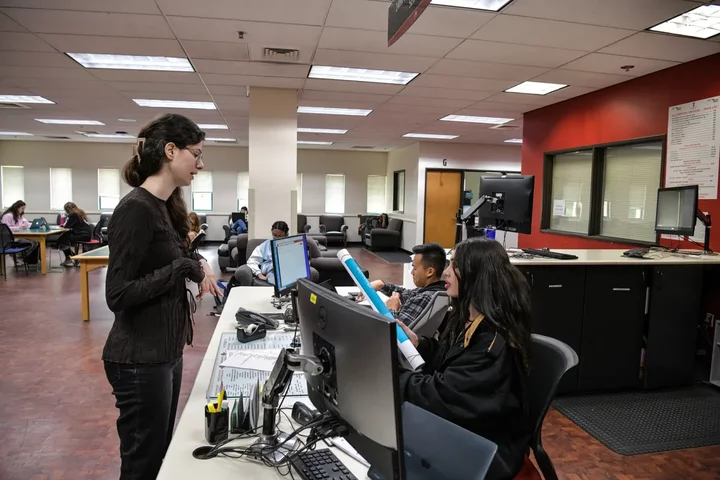Delilah Mays-Triplett works from her work station as a student assistant inside the Love Library Edition at San Diego State University in San Diego on April 12, 2023. Photo by Pablo Unzueta for CalMatters
Delila Grubaugh wasn’t sure if joining a union would benefit her. That is, until she contracted pneumonia and found herself unable to get paid sick leave, forcing her to work her library assistant job at Cal State Fullerton while ill. Access to paid sick leave is why Grubaugh, a third year communications major, joined student workers across the Cal State system who voted yes to a union.
Among the 20,000 student assistants working in the system, 7,750 cast a ballot, with 7,050 voting yes to a union, according to results released by the CSU Employees Union Feb. 23. Priorities for student assistants include paid sick leave, affordable parking, an increased cap on working hours and fair wages.
Student workers like first-year sociology and political science student Maddux Erkerling, who works as an assistant for the Jewish Studies Department at San Francisco State, rely on their jobs to pay for college expenses, including housing. Studying and working in an expensive area makes this especially difficult.
“I was working two jobs last semester, and was still about $200 to $300 short on my rent every month,” said Erkerling, who also works as an organizer for the union. “I had to rely on scholarships just to pay my rent and food bills.”
Last semester, Erkerling contracted COVID-19, costing him $600 in lost wages. While Erkerling acknowledges that he is “very grateful” for the community at his workplace, he said many students are pressured to work while sick because they need the money.
The recent unionization efforts of Cal State undergraduates follows last year’s University of California graduate student worker’s strike where over 36,000 employees campaigned for benefits like increased wages, anti-bullying protections, maternity leave and transit passes. The strike ended after two months of protests and bargaining between the UC graduate students and university officials.
Paid sick leave is one of the main points that the union emphasized in its campaign. Since last October, campus organizers have been urging the 20,000 student workers to vote to join the 16,000 members of the CSU Employees Union. In a press release, Catherine Hutchinson, the president of the employee union, encouraged students to unite to fight for better working conditions and fair pay. “Student work is real work,” said Hutchinson in the release.
Cal State spokesperson Amy Bentley-Smith referred to Vice Chancellor for Human Resources Leora Freedman’s statement as the system’s official response to the union vote, noting the “long history of providing on-campus jobs to students through student assistant positions” and that the Cal State system “looks forward to bargaining in good faith.”
“Some student workers earn less than their local minimum wages. We want to negotiate for better wages.”
— Cameron Macedonia, a fourth-year student at Cal State Fullerton and union organizing intern
For some students, their job is more than work — it’s an opportunity to gain experience early in their careers. Zoe Flohr, a senior psychology and sociology major at Cal State Bakersfield, said being a student assistant gives her insight into what it is like to be a professor. As a teaching assistant, Flohr holds office hours and study sessions, helps create exams, grades assignments and quizzes and responds to student questions through email or Canvas.
Flohr said her main priorities for the union are better working conditions in addition to higher pay, increased work hours to 30 a week, and opportunities to work on weekends.
“I think it depends on the student, like how many classes they’re taking and how often they’re on campus, but since the price of rent is increasing, the students want to be able to work more than their 20-hour limit,” said Flohr.
According to union organizing intern Cameron Macedonia, a fourth-year student at Cal State Fullerton, fair wages and lower parking costs have also been priorities for student workers. Faculty and staff typically pay lower parking rates than students.
“A majority of our students make minimum wage and the university actually isn’t even required to pay local minimum wage,” Macedonia said. “So some student workers earn less than their local minimum wages. We want to negotiate for better wages. We want to negotiate for affordable parking.”
On the day the vote result was announced, student organizers celebrated. Next, the work begins. The union and Cal State officials will meet to negotiate a contract, though exact dates have not been set.
“Right now, the next steps are to get a bargaining team of students and student workers together and meet with the CSU to sit at the same table as them for, like, the first time in history, ” Macedonia said.
###
Barahona, Chkarboul, Munis and San Roque are fellows with the CalMatters College Journalism Network, a collaboration between CalMatters and student journalists from across California. CalMatters higher education coverage is supported by a grant from the College Futures Foundation.
CalMatters.org is a nonprofit, nonpartisan media venture explaining California policies and politics.

CLICK TO MANAGE